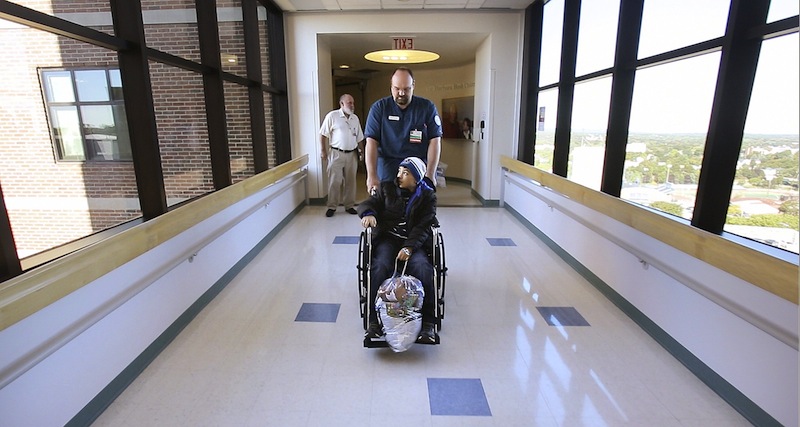Central Maine Medical Center in Lewiston wants to renovate its 30-year-old maternity and neonatal unit and turn an empty parking lot into a medical office building.
Northern Maine Medical Center in Fort Kent needs to replace a 14-year-old MRI machine.
Those and other investments at hospitals around the state are on hold as Maine’s 39 hospitals wait for $484 million in overdue Medicaid reimbursements.
They may not have to wait much longer.
On Monday, Democratic leaders in the Legislature released a plan to repay the hospitals by using an upfront payment for the state’s next wholesale liquor contract.
Gov. Paul LePage has a proposal to repay the hospitals with a different process. The state would borrow to pay off the hospitals, then repay the bonds with future liquor revenue.
While there’s no agreement yet on which of the competing plans would be used to repay the hospitals, the consensus from Democratic and Republican leaders appears to be that the debt will soon be settled.
Hospitals would receive $186 million in back payments from the state, which would trigger $298 million in payments from the federal government.
“We desperately need to be paid for the services already provided to move forward,” said Charles Therrien, president and CEO of Maine Coast Memorial Hospital in Ellsworth, in testimony Monday before the Legislature’s Veterans and Legal Affairs Committee.
The hospitals are grappling with state budget cuts, a downturn in elective procedures, bad debts in the weak economy and automatic federal spending cuts that took effect March 1 and reduced Medicare reimbursement.
“The (Medicaid) debt is just an added problem on top of that,” said Jeff Austin, spokesman for the Maine Hospital Association. “All problems were not created by the debt, and all problems will not be solved by the repayment. But it’s a huge issue.”
Austin said the repayment would not be a windfall for the hospitals because it would be for services already provided. Also, Medicaid does not reimburse 100 percent of costs, he said.
But the repayment could allow some hospitals to avoid borrowing money for expenses such as payroll. It could also allow them to delay or prevent some planned layoffs and go forward with some capital projects, Austin said.
Michael Koziol, chief financial officer of MaineGeneral Health in Augusta and Waterville, said he’s taking a cautious approach to the repayments.
“I’m not spending the money until we get it,” he said. “Until this gets resolved, you can’t count on it.”
MaineGeneral is owed $44.7 million. Koziol said the money would go toward paying off about $18 million that the hospital has borrowed to meet its daily expenses.
MaineGeneral also would try to build a cash reserve that it is required to maintain under certain debt agreements.
MaineHealth, which includes Maine Medical Center in Portland, said recent investments in electronic medical records and other initiatives have eroded its cash cushion. That decline, and uncertainty about the state’s repayment, were cited by MaineHealth’s credit rating agency, Standard & Poor’s, which last year issued a negative outlook on its debt.
Some hospitals have blamed layoffs on the overdue Medicaid payments.
St. Mary’s Regional Medical Center in Lewiston said in December that it would restructure and eliminate as many as 25 positions if it were not repaid.
Laird Covey, president of Central Maine Medical Center, said Monday that the hospital has cut 12 management positions in the past year and has 80 fewer full-time positions than it did a year ago.
“We’re finding it very difficult to continue to cut costs fast enough to keep our heads above water,” Covey told legislators Monday.
Other hospitals have put on hold investments that they say would help them expand services and provide better care.
Southern Maine Medical Center in Biddeford, for example, said it would use the state and federal money to build another walk-in care center and invest in the development of electronic medical records.
The hospital is also assembling teams of caregivers, ranging from primary caregivers and nurses to nutritionists and mental health care professionals, to treat and monitor chronically ill patients, rather than just treat them on an expensive, emergency-only basis.
“We’re investing in services to reduce the cost of care over the long term,” said Sue Hadiaris, vice president of planning and development at Southern Maine Medical Center. “We need resources and funds to make investments that keep people healthier over the long run and reduce costly visits to the (emergency department). We have to hire people and have more space.”
Jessica Hall can be contacted at 791-6316 or at:
jhall@pressherald.com
Send questions/comments to the editors.


